Search Results
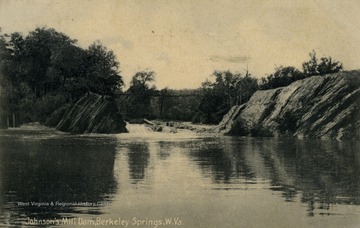
- IDNO:
- 041806
- Title:
- Johnson's Mill Dam; Berkeley Springs, W. Va.
- Date:
- ca. 1910
- Description:
- See original for correspondence. (From postcard collection legacy system.)
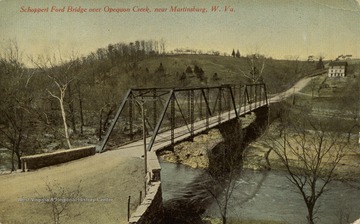
- IDNO:
- 041807
- Title:
- Schoppert Ford Bridge Over Opequon Creek; Martinsburg, W. Va
- Description:
- Bridge washed away in 1936 flood. Published by Fred H. Baker. (From postcard collection legacy system.)
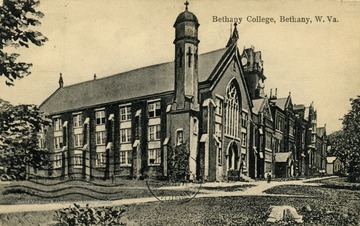
- IDNO:
- 041808
- Title:
- Bethany College; Bethany, W. Va.
- Date:
- ca. 1910
- Description:
- Founded in 1840, Bethany College is the oldest institution of higher learning in West Virginia. See original for correspondence. Published by John R. Elson. (From postcard collection legacy system.)
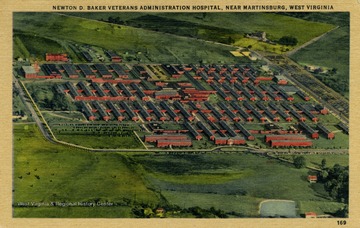
- IDNO:
- 041809
- Title:
- Newton D. Baker Veterans Administration Hospital; Martinsburg, W. Va.
- Description:
- Caption on postcard reads: "This Veterans Hospital, which is located about five miles from Martinsburg, West Virginia is one of the many hospitals operated by the Veterans Administration in the United States. Approximately 1,400 beds are available for veterans' use. Published by Marken & Bielfield Incorporated. (From postcard collection legacy system.)
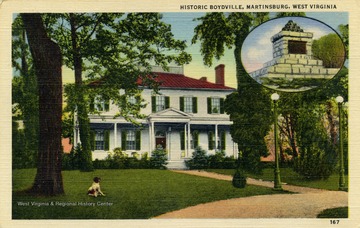
- IDNO:
- 041810
- Title:
- Historic Boydville; Martinsburg, W. Va.
- Description:
- Caption on postcard reads: "This beautiful home was built in 1812 by Elisha Boyd. It still remains in the family and is owned by Charles J. Faulkner, Jr., grandson of the builder. It is noted for its gorgeous interior workmanship. Inset is the marker on the Boydville Estate erected to General Adam Stephen, Revolutionary War commander, legislator and founder of the city. The monument was erected by The Daughters of the American Revolution." Published by Marken & Bielfeld Inc. (From postcard collection legacy system.)

- IDNO:
- 041811
- Title:
- Boydville, Residence of Ex Senator Chas. Faulkner; Martinsburg, W. Va.
- Description:
- Charles Faulkner was born in Martinsburg, West Virginia in 1806. He was a member of the Virginia House of Delegates from 1829 to 1834 and served as a commissioner of Virginia in handling the disputed boundaries of Virginia and Maryland. From 1851 to 1859 he served as a Whig and Democrat in the U.S. House of Representatives. In 1860 Faulkner was appointed by President James Buchanan as Minister to France. While serving he was arrested in 1861 on charges of negotiating arms sales to the Confederate army. Later that year he was released and enlisted with the Confederate Army as an assistant General under Stonewall Jackson. After the war he returned to work within the West Virginia state government until 1877 when he retired to Boydville to continue practicing law. Published by Louis Kaufmann & Sons. (From postcard collection legacy system.)
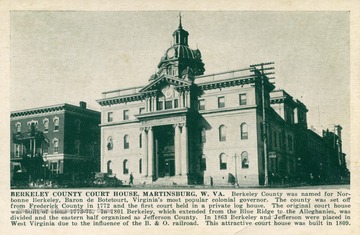
- IDNO:
- 041812
- Title:
- Berkeley Co. Court House; Martinsburg, W. Va.
- Date:
- ca. 1925
- Description:
- Caption on postcard reads: "Berkeley County was named for Norbonne Berkeley, Baron de Botetourt, Virginia's most popular colonial governor. The county was set off from Frederick County in 1772 and the first court held in a private log house. The original court house was built of stone 1773-75. In 1801 Berkeley, which extended from the Blue Ridge to the Alleghanies, was divided and the eastern half organized as Jefferson County. In 1863 Berkeley and jefferson were placed in West Virginia due to the influence of the B. & O. Railroad. This attractive court house was built in 1809." Published by Shenandoah Publishing House. (From postcard collection legacy system.)
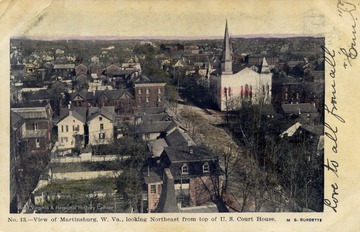
- IDNO:
- 041813
- Title:
- Looking Northeast From Top of U.S. Court House; Martinsburg, W. Va.
- Date:
- ca. 1906
- Description:
- See original for correspondence. Published by M.S. Burdette. (From postcard collection legacy system.)
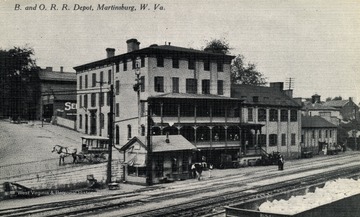
- IDNO:
- 041814
- Title:
- Baltimore and Ohio Railroad Depot; Martinsburg, W. Va.
- Description:
- (From postcard collection legacy system.)
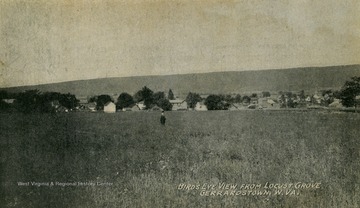
- IDNO:
- 041815
- Title:
- Bird's Eye View From Locust Grove; Gerrardstown, W. Va.
- Description:
- The town of Gerrardstown was laid out in 1784 by David Gerrard and served as the site of the first Baptist Church west of the Blue Ridge Mountains. Published by B.C. Baker. (From postcard collection legacy system.)
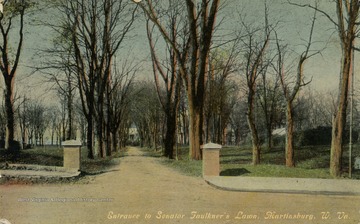
- IDNO:
- 041816
- Title:
- Entrance to Senator Faulkner's Lawn; Martinsburg, W. Va.
- Date:
- ca. 1914
- Description:
- Charles Faulkner was born in Martinsburg, West Virginia in 1806. He was a member of the Virginia House of Delegates from 1829 to 1834 and served as a commissioner of Virginia in handling the disputed boundaries of Virginia and Maryland. From 1851 to 1859 he served as a Whig and Democrat in the U.S. House of Representatives. In 1860 Faulkner was appointed by President James Buchanan as Minister to France. While serving he was arrested in 1861 on charges of negotiating arms sales to the Confederate army. Later that year he was released and enlisted with the Confederate Army as an assistant General under Stonewall Jackson. After the war he returned to work within the West Virginia state government until 1877 when he retired to Boydville to continue practicing law. See original for correspondence. Published by Ripple & Baker. (From postcard collection legacy system.)
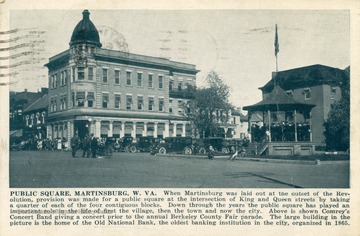
- IDNO:
- 041817
- Title:
- Public Square; Martinsburg, W. Va.
- Date:
- ca. 1925
- Description:
- Caption on postcard reads: "When Martinsburg was laid out at the outset of the Revolution, provision was made for a public square at the intersection of King and Queen streets by taking a quarter of each of the four contiguous blocks. Down through the years the public square has played an important role in the life of first the village, then the town, and now the city. Above is shown Comrey's Concert Band giving a concert prior to the annual Berkeley County Fair parade. The large building in the picture is the home of the Old National Bank, the oldest banking institution in the city, organized in 1865. See original for correspondence. Published by Shenandoah Publishing House. (From postcard collection legacy system.)











